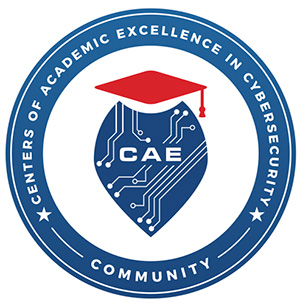Welcome to Lansing Community College's Center for Cybersecurity Education. Here we have tips for protecting yourself online, the latest cybersecurity news, and information on getting your Computer Security & Networking degree and skills to get a job in the cybersecurity field. The LCC Center for Cybersecurity Education will become THE resource for Cybersecurity for this region for education, business, industry, government, and Community.
Lansing Community College is a National Center of Academic Excellence (CAE) in Cyber Defense Education designated by the National Security Agency (NSA) and the Department of Homeland Security (DHS). The Computer Networking Technology, AB degree is the validated CAE Program of Study (PoS).
Email LCC's CAE Point of Contact and Administrator, Jason Mitchell - mitch24@lcc.edu, for more information.
LCC Offers Dynamic Cybersecurity Education
Cisco Certified Network Associate Certification Preparation (CCNA), CC
Computer Networking Technology, AB
Digital Evidence Specialist, AAS
Cybersecurity Events
No upcoming events at this time. Visit the LCC college wide calendar to see what else is happening.
Cybersecurity News
TheHackerNews.com
LockBit Developer Rostislav Panev Charged for Billions in Global Ransomware Damages
clock December 21, 2024
Lazarus Group Spotted Targeting Nuclear Engineers with CookiePlus Malware
clock December 20, 2024
Rspack npm Packages Compromised with Crypto Mining Malware in Supply Chain Attack
clock December 20, 2024
Sophos Issues Hotfixes for Critical Firewall Flaws: Update to Prevent Exploitation
clock December 20, 2024
Hackers Exploiting Critical Fortinet EMS Vulnerability to Deploy Remote Access Tools
clock December 20, 2024
Cybersecurity Resources
-
Action
- FBI list of field offices to report ransomware
- Secret Service field office to report ransomware
- Bleeping Computer: Malware and spyware removal guide
- National Security Agency Information Assurance Library: Advisories and alerts, guidance and useful reports that are tested by the agency to ensure hardened security
- Common Weakness Enumeration: CWE provides a unified, measurable set of software weakness that is enabling a more effective discussion, description, selection and use of software security
- Test Your Browser for Scumware
- Test a Suspicious File - uploaded files are run through a set of virus scanners
-
Assessment
- Microsoft Security Assessment Tool (MSAT): A risk-assessment application designed to provide information and recommendations about best practices for security within an information technology (IT) infrastructure.
- Top Linux network security tools
- Cyber-attacks timeline and statistics
- SANS Resource Page
- NIST Cybersecurity Framework
- Health Information Technology Privacy and Security
- Tenable Network: 20 Security Network Controls
-
Awareness
- Stay Safe Online: A national alliance to promote individual and business's awareness in safe online practices, partnering with K-12, higher education and community-at-large
- How to Stay Safe Online: This PBS-Nova resource aims to promote and equip students (and those young-at-heart) to stay safe online; through videos, games and engaging challenges in coding, password cracking and social engineering and others, users learn how to keep their digital lives safe
- Cybersecurity for Small Business (FCC)
- Google's Safety Center, tips and resources
- Microsoft Safety & Security Center, a wealth of guides and resources
- Privacy Rights Clearinghouse, a great place to understand your privacy rights, learn about the various policy issues, and search for data breaches that may have affected you.
- Tips on managing your privacy online: How Much Privacy Do You Have Online?
-
External Resources
- FBI Safe Online Surfing: Resources and activities for 3-7th grade students and teachers
- Consortium of Minorities in Cybersecurity: Resources for minorities interested in cybersecurity
- Cyber Forensic Education: Resources for students and faculty interested to learn more about cyber forensics
- The Colloquium for Information Security Education: Resources for educators, researchers, and practitioners to improve curricula and foster discussion of current and emerging trends
- National Initiative for Cybersecurity Careers and Studies: Resources for the general public interested in knowing more about cybersecurity careers and studies.
- National CyberWatch: Resources for higher education institutions, businesses, and government agencies to advance education, research and strengthen the national cybersecurity workforce.
- National Cyber Security Alliance: Resources for the general public interested in staying safe online.'
- National CyberSecurity Awareness: Resources for organizations interested to promote cybersecurity awareness
- SANS Security Awareness Newsletter: Resources for the common computer users interested in improving security awareness
- NSA Outreach Programs: Resources for teachers at the K-12, undergraduate and graduate levels to engage students on STEM and Cybersecurity
- National Cybersecurity Student Association: Resources for students interested in educational and professional development in cybersecurity.
- Join InfraGard: InfraGard is a partnership between the FBI and the private sector dedicated to sharing information and intelligence to prevent hostile acts against the U.S.
- National Cybersecurity Competition: This national competition provide collegiate students to develop, practice, and validate their cybersecurity offensive skills.
- Hacker News: This website provides information news and information affecting cybersecurity attacks and breaches.
- Linux Security: Feature articles to keep readers be informed of the latest Linux advancements.
- Naked Security: This website is developed by Sophos, a cybersecurity solutions provider to inform general users of important computer security news.
- FTC: Resources for small businesses.
- Cyber Security Jobs: Cybersecurity job listings.
- Cyberseek: Cybersecurity job listings.
-
Internal Resources
- Information Security at LCC
- Board Policies (login required)
- 5Star Knowledge Base Articles (login required)
- File Storage Guidelines
- Approved Software List
- Information Technology Request/Approval Form
- Identity Finder User Guide
- Password Security
- How to Have Strong Physical Security
- How to Send Social Security or Credit Card Numbers in Email
- How to Password/Pin/Thumbprint Protect Your LCC Issued Device
- Power Saver Settings for Your LCC Issued Device
- Handling Requests for Personal Employee Information
- How to Encrypt Your LCC Issued Device
- LCC Privacy Statement
- CSI-LCC: Computer Security Information for LCC Employees - annual training available in the Talent Management System in myLCC (login required)
Upcoming Hacking Competitions
CTFZone 2024 Quals
5 am – 5 am
Lexington Informatics Tournament CTF 2024
11 am – 11:59 pm
idekCTF 2024
8 pm – 8 pm
SekaiCTF 2024
12 pm – 12 pm
Meet the Instructors
Computer Networking Technology, AB program - Program Level Outcomes
Lansing Community College emphasizes program-level outcomes, measurable skills, knowledge, and abilities that students are expected to gain upon completing a specific program. These outcomes align with industry standards and aim to ensure graduates are well-prepared for the workforce or further academic pursuits. They cover various areas such as technical proficiency, critical thinking, communication skills, and professional ethics. Program-level outcomes act as benchmarks for evaluating student achievement and program effectiveness, guiding curriculum development, and providing accountability to students, faculty, employers, and other stakeholders. The college's focus on these outcomes aims to empower students with the necessary competencies to succeed in their chosen fields and make meaningful contributions to their communities and society overall.
- Design, communicate, and follow documentation standards of complex data, processes, and or policies.
- Use specialized software applications effectively to create, manage, and complete IT tasks.
- Analyze a complex business problem and design, implement, and evaluate a solution by applying information technology principles and other relevant disciplines.
- Express professional responsibilities by making informed judgments in computing based on legal in ethical principles and practices.
- Function effectively and inclusively as a team member in a diverse group.
Advisory Committee
Lansing’s Community College CIT Advisory Board plays a pivotal role in shaping the educational landscape at our institution, offering invaluable expertise and guidance in the development of curriculum, degrees, and certificates. At the forefront of this collaborative effort is the General Business Industry Leaders Team (BILT) Committee, convening twice a year to provide strategic insights that ensure our academic programs align with the evolving needs of the business sector. This committee, comprised of accomplished leaders in various industries, offers a real-world perspective that enhances the practical relevance of our educational offerings. Additionally, during the Spring Semester, the Center for Cybersecurity Community Advisory Team convenes monthly to delve into the dynamic field of cybersecurity. This specialized team of experts not only contributes to the refinement of cybersecurity programs but also ensures our students are equipped with cutting-edge knowledge and skills to thrive in this rapidly advancing domain. The commitment of these advisory committees reflects our dedication to delivering a high-quality education that prepares students for success in today's competitive professional landscape. Email mitch24@lcc.edu for more information.

Contact Us
Computer Information Technology Program
Technical Careers Division
West Campus Room M103.4
Phone: 517-267-6406
Email: cit@lcc.edu







